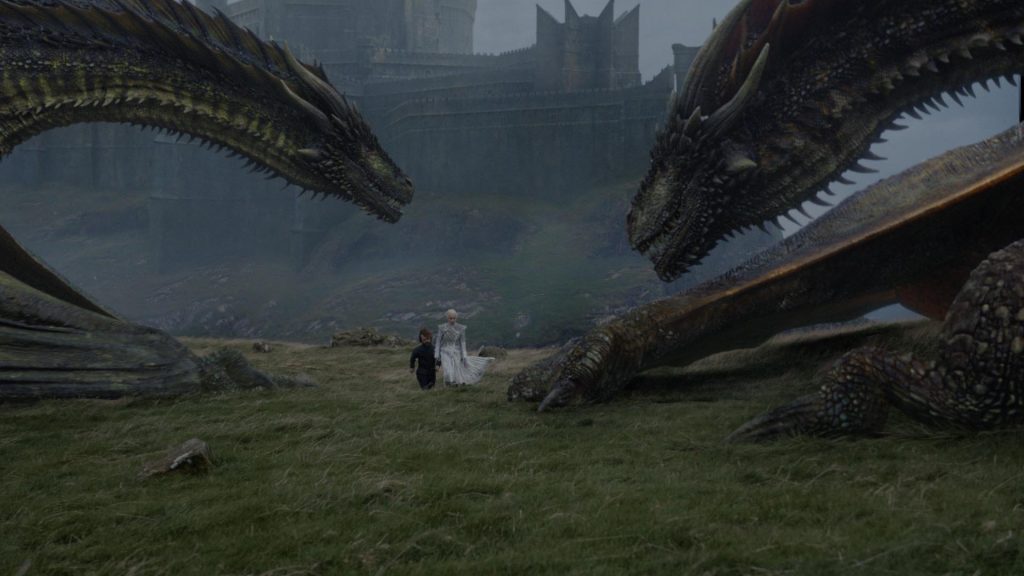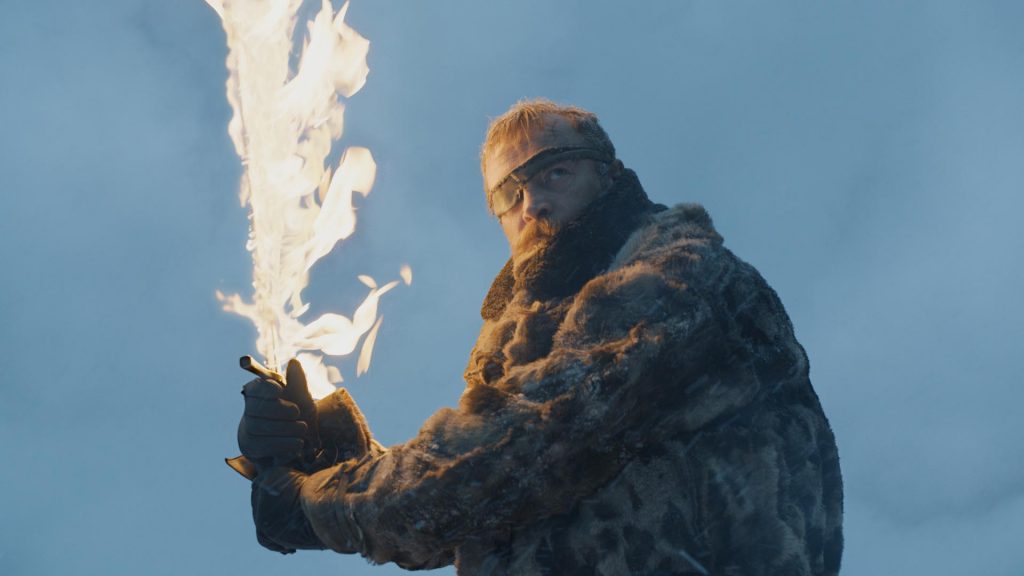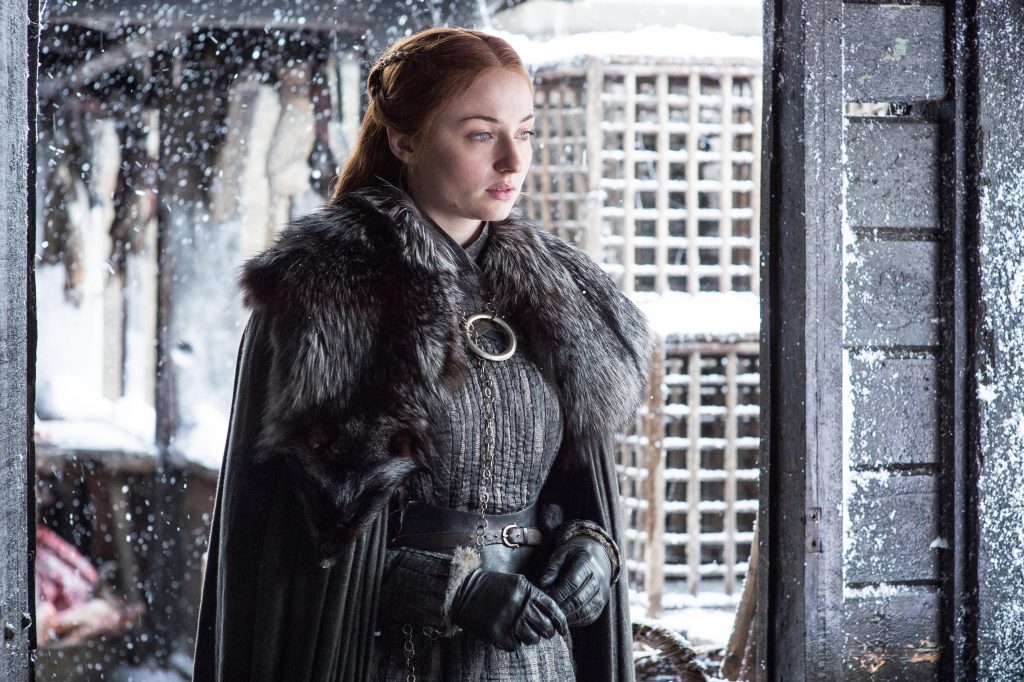‘Game of Thrones’ Recap: The Revenant

“Death is the enemy,” Beric Dondarrion tells Jon Snow beyond the Wall in episode six of this season of Game Of Thrones. “The enemy always wins, but we still need to fight him.”
Right from the pilot episode, Game of Thrones has signalled that it’s a show where the dead don’t stay dead. This applies to wights, obviously, but also to Bran’s quantum existence as a greenseer; to the magical resurrection of characters including Beric and Jon (but not, disappointingly, Catelyn Stark); to revelations that characters you thought were goners are still alive; and even more importantly, to the role of history and memory in ensuring the influence of the long-dead. Even Valyrian steel weapons like the sword Longclaw or Arya’s dagger are passed from hand to hand, reaching immortally into the future.
And talk about revenants – in this episode a bear in the wilderness attacked a guy with a man-bun. Give Paul Kaye an Emmy!
I enjoyed how deeply this episode was enmeshed in the theme that, to quote the religion of the Drowned God, “what is dead may never die, but rises again harder and stronger.” And it was filled with visual beauty. The landscapes north of the Wall had a harsh splendour; the wight battle had some excellent, Pirates of the Caribbean-level CGI; and it was so cool to see dragonfire blazing into the snow.

Trapped on an icy lake with zombies bearing down from every side, Jon appears to recognise the folly of his mission to capture a wight. But even more absurdly, the Suicide Squad actually succeeded, at the cost of only Thoros and a few anonymous extras – though the show teased us with the possible deaths of Gendry, Tormund, the Hound and Jon.
As Steve Coogan and Rob Brydon would tell you, banter is the real point of a trip. I especially loved Tormund’s droll, thirsty chat with the Hound, dreaming of the “great big monsters” he’s planning to father with Brienne of Tarth. The vulnerability that creeps in as he says, “Well, not with her yet, but I’ve seen the way she looks at me.” Give Kristofer Hivju an Emmy!
I’ve always been more of a Brienne/Jaime shipper than a Brienne/Tormund shipper, but Tormund truly is the man for her: he adores her beauty and strength where everyone else in Westeros sees her as ugly and ridiculous. Even Jaime condescends to look past all that. Still, Brienne’s on her way back to King’s Landing – can she persuade Jaime to find that spark of goodness inside him? Maybe my Brienne/Jaime ship is more like a Luke Skywalker/Darth Vader ship. Brrrr.
Here is a visual representation of the pacing in Game of Thrones. pic.twitter.com/HObMQHagvr
— TomSka (@thetomska) August 17, 2017
Game of Thrones has been speeding up for a while. For some fans, the rot set in with Varys’s merman trip from Meereen to Dorne; and this season, characters have defeated every challenge of geography, showing up exactly where they were needed to progress the game. (Sansa warns Brienne that her journey won’t be “on summer roads”, but what’s the bet she’s in King’s Landing next episode?) This week’s serendipity has especially annoyed people. Gendry’s hitherto untapped talent as a marathon runner. The fact a raven is both like a writing desk and a mobile phone. Daenerys’s Concorde-speed dragons.
Here’s one way I feel okay with this. Game of Thrones has often been praised for its real-life historical inspirations, and creeps (including its author) have justified its sexual violence as part of this realist depiction. Those people are like the Grand Maester nerd committee down in the Citadel: dismissing Sam’s eyewitness testimony because it doesn’t fit their received wisdom.
But this is a world where seasons can stretch for years; what if geography is becoming just as elastic? After all, forgotten powers – chronicled, ironically, in the Citadel’s own library – are on the rise. Past certainties – and I’m afraid I see Tyrion as a desperate status quo champion – are counting for less. The Dothraki idiom “It is known” no longer applies; Beric has made peace with the fact he doesn’t know what the Lord of Light wants. And who’s the best leader for these uncertain times? The guy who knows nothing!
I’m all in for Jon/Daenerys. I do not care at all that they are related. I enjoyed that the show managed to eroticise the proof of Jon’s death through Dany’s gaze. Why bend the knee when you can hold the hand? (Plus, Jon listened to Tormund’s advice not to be as fatally stubborn in his independence as Mance Rayder was.) And I especially liked that when Daenerys tells Jon, “You should get some rest,” he squeezes his eyes shut in the overdetermined manner of a toddler! Which he is, basically!
It’s taken Daenerys until now to realise the true war she’s in, despite her snowy visions in the House of the Undying back in season two. Had she been warned not to conquer King’s Landing, but to defend it? Does she finally realise her dad was right to “burn them all” – but ‘they’ are the armies of the dead, not her living enemies?
And could her vision of Drogo and baby Rhaego north of the Wall – which she saw as a lost future – actually be a sign that a new family awaits her if she chooses to go north? She believes her dragons are her only children, but ice and fire might still produce heirs to whom Jon can hand down Longclaw.
In a spectacular but not very surprising twist, Viserion – the dragon named for Daenerys’s worst brother, the reason she now hates the nickname Dany – is now the Night King’s steed. An ICE DRAGON, what was I telling you a few weeks back? Do you reckon their breath freezes everything instead of burning it? Can only a dead person ride it?
Fans are speculating that the Night King bailed up Jon and his mates as bait to bag a dragon, in the same way Jon wanted to bag a wight. Because the Children of the Forest created the Night King, perhaps his precognitive powers are similar to Bran’s – or even psychically linked. So maybe the Night King already knew Daenerys would show up to rescue Jon, and had his ice-spears ready, plus the chains needed to drag Viserion’s corpse from the lake.
But some all-too-convenient plot mechanisms did annoy me. When Jon was rescued by a mysterious saviour wielding a flaming flail, I roared at the screen: “It’s fucking Coldhands!” Last seen escorting Bran and Meera south, he’s clearly the guy who pops up randomly north of the Wall when you can’t run as fast as Gendry.

In previous seasons, Game of Thrones might have lingered on Jon’s bittersweet reunion with his lost uncle Benjen, who inspired him to join the Night’s Watch in season one, and whose name was used as bait for the mutineers’ trap that killed Jon in season five. But no – the show’s got to keep moving. Benjen’s brief return here felt cheap and emotionally weightless. That’s not a respectful way to treat your dead.
By contrast, the show’s writers are fatally addicted to boring monologues in which characters deliver an info-dump of backstory (usually about their childhood) while another character listens patiently. We had to sit through one of these from Arya this week, in which Arya underlines that she, and not her sister, has always had the tenacity and ruthlessness needed to run the North.
Some fans are disappointed that Arya’s become so mean and emotionless, and have even attributed it to dissociation from trauma. But I personally think Arya’s playing a long Game of Faces. She wants Littlefinger to think that his plan to sow chaos is working; but she hands the dagger to Sansa, handle first, to show she isn’t a true threat to her.

Arya’s bag of faces should warn everyone that you never like what you find when you snoop in your sibling’s room. But Sansa’s never been great at decision-making. Perhaps Arya understands – and Bran, too, in giving her the dagger – that Sansa’s decisions will endanger everyone. Arya, on the other hand, knows that every death is just a new face…
–
Game of Thrones is streaming on Foxtel Now and airing on Showcase at 11am and 8.30pm every Monday.
–
Mel Campbell is a freelance journalist and cultural critic. She tweets at @incrediblemelk.


